#sanctuary of amphiaraus
Text

Marble prohedria (honorary seats) at the ancient theatre of the Amphiareion of Oropos, Attica, Greece.
#marble#prohedria#honorary#seats#chairs#thrones#ancient greece#ancient greek#theatre#europe#european#amphiareion of oropos#attica#art#history#greece#sanctuary#temple#antiquity#amphiaraus#amphiaraos#honour#honorific
454 notes
·
View notes
Text
Dio supplements this with the information that Brutus and Cassius were honoured in all the major cities of Greece, but especially in Athens, where bronze of them were erected in the marketplace next to those of the Greek tyrannicides, Harmodius and Aristogeiton. The juxtaposition and assimilation of Caesar's assassins to these legendary heroes would seem too neat a historical coincidence to be true, were it not for the fact that archaeological evidence supports Dio's account. As Antony Raubitschek has demons a two important articles, the catalogue of finds from the Attic region includes a statue base of Brutus in the sanctuary of Amphiaraus in Oropos than 30 miles northeast of Athens, as well as a fragment of the very pedestal on which the statue of Brutus stood in the agora.
I TOLD YOUUUUUUUUU I KNEW IT ALL ALONG !!!!
2 notes
·
View notes
Photo
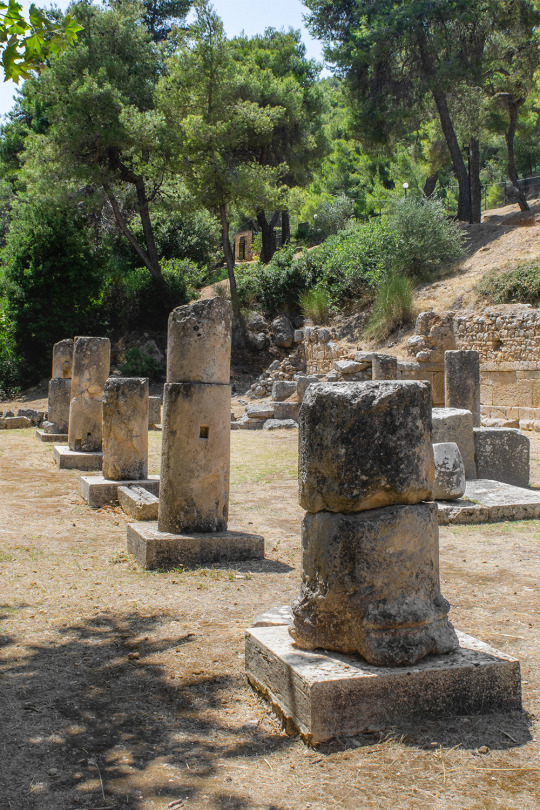
Remains of the Temple of Amphiaraus at the Sanctuary of Amphiaraus (Attica, Greece)
#ruins#ancient ruins#ancient greece#greece#attica#ancient temple#temple#columns#ancient architecture#original photogrpahy#sanctuary#sanctuary of amphiaraus#greek architecture#column#archaeology#classic architecture#travel photography#beige#doric
125 notes
·
View notes
Text
Amphiareion of Oropos, Greece, is a 5th century BC sanctuary dedicated to the heroic Seer and demigod, Amphiaraus. The sick visited to be healed and the anxious went to learn their future.
20 notes
·
View notes
Photo

Amphiareion of Oropos (Sanctuary of Amphiaraus), Attica, Greece
#greece#attica#europe#travel#ancient ruins#ruins#ancient greece#architecture#landscape#nature#columns#ancient column#column#amphiareion of oropos#sanctuary#ancient architecture
151 notes
·
View notes
Note
What are your favorite epithets/titles of hermes, hera and ares?
(Thank you for the ask nonnie! 🤍)
For Hermes:
Hermes Eriboas ("he who is loud") - this is my personal favorite because hermes is a positive deity; his loudness is like a shout of support to anyone who needs it
Hermes Argeiphontês ("he who slew the giant Argus") - this is reverend to the slaying of Argus, to what he's capable of doing, like Apollo with Python or Zeus with Typhon ***though I believe this title is never mentioned in the presence of Queen Hera out of respect***
Hermes Pikilóvoulos ("the clever one") - never underestimate the cleverness of Hermes. my boi was literally a baby when he tricked Apollo, god of knowledge mind you, with the cows. Zeus had to give him many responsiblities so that he won't carry on as a naughty trickster all the time.
Hermes Charidotes ("giver of joy") and Hermes Éfphrohn ("happy, joyful, kindly, and gracious one") - Hermes is usually a happy deity. He brings joy from the lyre, from his stories, from his laugh. He's the type of god who'd make a kid laugh, but disappear at the second glance, to give the kid a sense of wonder.
Hermes Diaktoros ("the wayfinder") and Hermes Poimandres ("shepherd of men") - even though he has a lot of responsibilites, Hermes is also a god of travel and he makes sure when you travel, you are safe. If you are lost, he will be your guide, he will help you find your way back to the road.
For Hera:
Hera Zygia ("she who presides over marriage") - this is the epithet she shares with her husband Zeus Zygius, as the ones who presides over marriage.
Hera Pais, Hera Teleia, Hera Chêra ("the Maiden", "the Married Woman" and "the Widow") - this triad of surnames were given her by Temenus, the son of Pelasgus. In some accounts it was he who had brought up Hera, and had built at Old Stymphalus three sanctuaries under three different names for her. Hera Pais refers to her status as a maiden before her marriage; Hera Teleia as the wife of Zeus, and Hera Chêra as a "widow" alluding to her separation (and eventual reconciliation) from Zeus. Hera is the goddess of women, married women especially, so these epithets show the three stages of a married woman's life.
Hera Hupercheipia ("she who holds her protecting hand above") - Hera had this epithet at the sanctuary in Sparta, which had been built her at the command of an oracle, when the country was flooded by the river Eurotas. There is no myth of them drowning, so it's safe to assume she did protected them, and would protect anyone dear to her.
Hera Basíleia ("Hera the Queen") - Hera is THE lady of authority. While she may be characterized as simply "Zeus' wife", there is evidence that she had temples built for her even before Zeus was. She can also be seen as a challenger to many heroes. She is given the same respect as one would give Zeus being his wife AND older sister. While she is not physically as strong as Zeus, her endurance, wit and feisty personality makes up for it. In short, slay Queen, slay.
Hera Alexandros - ("Protector of Men") - prehaps my personal favorite for some unknown reason, this is given to her among the Sicyonians. Adrastus, a king of Argos, built a temple for her in Sicyon after he was expelled by his co-ruler Amphiaraus. This shows that Adrastus had not forgotten his patron goddess, and that he will be protected by her even in another land. Amphiaraus then reconciled with Adrastus, and returned to his kingdom of Argos upon the horse Arion. (Sadly, Adrastus' story does not end happily, but he is remembered and worshipped in several parts in Greece)
Hera Boôpis ("she who is cow-eyed") - just a tribute to Hera's beautiful brown eyes. A cow's eyes was considered beautiful in Ancient Greece (she and Persephone share this epithet.)
For Ares:
Ares Aphneios ("Abundant" or "giver of food") - attributing to my favorite Ares myth, this title was given to Ares in Arcadia, after Aerope (Ares’ lover) died in childbirth, but Ares caused her to nourish their son Aeropus nonetheless. This epithet is a reminder of Ares' duty to his son.
Ares Árriktos ("unbreakable") and Ares Adámastos ("unconquerable") - these epithets are just amazing for me. Of all the gods, it is Ares who knows what is like to be defeated. To be chained down, to be humiliated on more than one occasion, to be betrayed by your family. Even being trapped in a jar. And yet, the god of war still stands. His heart carries on, not because of manly pride, but because he loves himself enough to carry on. That's beautiful.
Ares Teichesipletes ("storms the cities in battle") - In the end of day, Ares still has a duty as the god of war. He, along with his retinue, enjoy the thrill of battle, storm and cause chaos to cities and unfortunate mortals. It's in their blood. He, Enyo, Eris, Deimos and Phobos are one chaotic war family, and he loves them.
Ares Oplokharís ("rejoicing in arms") - as wars have defeats, they also have victories. Ares also experiences victories in battles, especially in the hearts of the soldiers, and Nike is with him (in some accounts Nike is Ares' daughter). The soldiers rejoice and celebrate due to the courage and bravery Ares gives them.
Ares Gynaikothoinas (“feasted by women”) - It refers to the god’s intervention on behalf of the Tegean women who fought against Lacedaemonian king Charillus. They ambushed as a form of attack and won. A festival was held every year by the women in which men were, hilariously, not allowed to participate. (And good for them! ❤ this is also a cool epithet for the modern concept of Ares as a feminist)
#take note: if i get a translation wrong pls correct me!!#im not greek#just a filo whose confused about religion but loves her greek gods#ares#hermes#hera#greek mythology#epithets#ares epithet#hermes epithet#hera epithet
109 notes
·
View notes
Text
okay to reblog;;
OKAY SO !!! during my trip to Greece I learned a lot through the series of lectures ( we focused on oracles && oracular sites ) but one of the most interesting was a lecture given in Lebadeia ( which held an oracular site and healing center to Trophonius ) on ancient Greek necromancy. Upon further thinking and talking with a friend I realized this would be information the Greek indies and possibly the Nico / Bianca blogs might be interested in as it applies to them and gives an interesting outlook considering the modern shift in thinking on the topic.
I’m going to preface this by saying a lot of the information I’m giving is directly translated from ancient literary sources and short at best. I did not do more research into the topic outside poking around at the myths and asking questions during the lecture. Anyone is free to message me if they have questions since what I included below is just a summary...
To the ancient Greeks necromancy was NOT a bad thing. It was not seen in the light we view it today. In that sense it was not taboo. To the ancient Greeks necromancy was a means to an often positive end. It’s stated that necromancy itself was only as bad as the person preforming it. The only problem was necromantic practices were not written down and the only real information we have is in first hand oracular accounts or references in other forms of writing. So while the Greeks didn’t see necromancy as bad, they didn’t advertise it.
So why was necromancy not a bad thing? Well, the ancient Greeks were not scared of the dead for starters. Strange to us today, seeing as all our horror stories involve the dead ( zombies, ghosts, satanic rituals, etc ) but it seems they just wanted to help the dead on their way. Most references to ghost are actually involved with prophetic instances. The most commonly haunted places were bathhouses and battle fields.
bathhouses are connected with springs, and springs run underground. For the Greeks this meant that bathhouses had ties to the underworld and the sprits followed that same path. Following this same logic the underworld is often associated with oracles as well, being as underground springs are a staple of oracular sites.
Aside from the locations of spirits, the ancient Greeks often practiced necromancy to the best of our knowledge in order to pass messages along to the dead ( ample evidence found in graves - more on that in a minute ) and to help ghosts to the underworld. They saw ghosts as those with unfinished business and tried to help those ghosts complete their tasks so that they may move on and rest. Again, they were not scared of the dead.
Then why oracles? As I said oracles are associated with springs and springs are related to the underworld, but there is more. Two distinct and popular oracular sites are related to the underworld in other ways as well. Amphiaraus and Trophonius are both prominent ancient Greek oracles who’s oracular sites have strong ties to the underworld. Also of note, these are both also sanctuaries of healing ( the underworld has close ties to healing throughout ancient Greek thought ). Amphiaraus directly gives his prophecies from the underworld. Trophonius’s oracles are given through what was clearly necromantic practices as we have a first hand account in the written record from Pausanias. ( this is where I say be carefuly what you read on the internet because everything in regards to Trophonius speaks of nightmares and horror. )
Either way, oracles have direct ties to the underworld.
This brings us to witches and curses. You may be asking yourself “but kat, didn’t you say necromancy wasn’t bad?” and you’re right. I did. But I also said its only as bad as the person preforming it. There are bad people. And so then what, perhaps, is bad necromancy? Raising dead bodies. That’s bad necromancy. There are some restrictions on this practice, though. It was believed you only had a short window with which to raise dead bodies after the person became deceased, and it was also believed you were trapping that person to the world of the living. The Greeks wanted to help spirits to their resting place not trap them here. Also? Why are you raising a body? If you’re raising a body clearly you have some anterior motive. You don’t just raise bodies for kicks...
witches were seen as people who raised dead bodies ( not spirits, flesh bodies ) in regards to making their own army or something to attack others. AKA not good stuff.
curses were mean things written down and buried with the dead. The idea was that the dead person would carry your message and / or curse down to the underworld where the message would be passed on or the curse would be put in place. Here it gets into a real mess because you find counter curses, counter counter curses, and so on.
This then begs the question of why do we see necromancy as we do today? Especially since a lot of thought supposedly comes from the Greeks and they saw necromancy as leaving no serious or lasting harm. Simple. When the Romans came around they saw this all and thought it bad. The Romans then took over a lot of places. Their ideas spread. In that mess we lost the Greek beliefs in relation to the dead and gained the Roman ones instead.
@shadowesqxe // @stygicniron // @byanger // @diangelic
#♆ ╱ ❛ greek shit.#non ca#necromancy#ancient greek necromancy#ancient greek oracles#oracular necromancy#greek mythology#ancient greek beliefs#♆ ╱ ❛ ooc.#anyway#finally did the thing#this shits cool !!!!!!#specially finding out how intertwined the underworld was w/ their daily beliefs#idk dont mind me
24 notes
·
View notes
Text
Amphiareion of Oropos
The Amphiareion of Oropos (Greek: Άμφιαρείον Ωρωπού) was a sanctuary dedicated in the late 5th century BCE to the hero Amphiaraos, where pilgrims went to seek oracular responses and healing. The hero Amphiaraos was a descendant of the seer Melampos and initially refused to participate in the attack on Thebes (detailed in the Seven Against Thebes of Aeschylus) because he could foresee that it would be a disaster. In some versions of the myth,the earth opens and swallows the chariot of Amphiaraos, transforming him into a chthonic hero.
Amphiaraus was a seer, and greatly honored in his time. Both Zeus and Apollo favored him, and Zeus gave him his oracular talent. After making a sacrifice of a few coins, or sometimes a ram, at the temple, a petitioner slept inside and received a dream detailing the solution to the problem.
0 notes
Photo
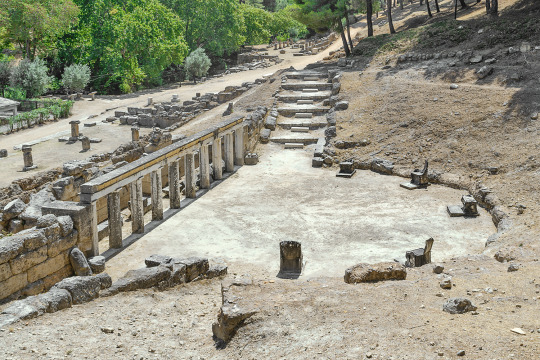
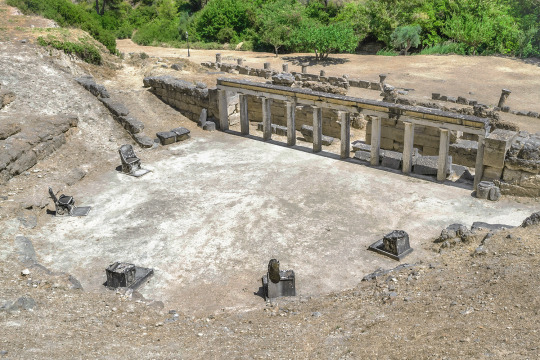
Amphiareion of Oropos (Sanctuary of Amphiaraus), Attica, Greece
Highlights: ancient theatre, klepsydra (ancient water clock), believed to be the first of its kind, and a Doric temple.
Other monuments: stoas, baths, altar, residential area with private houses, shops and offices.
The sanctuary was dedicated to the mythical hero Amphiarao (Amphiaraus), a king of Argos, favoured by both Apollo and Zeus, from whom he had received the ability to predict the future. After death he was transformed into a healing divinity. There are twelve temples and sanctuaries dedicated to him in Greece. The Amphiareion of Oropos is the most important of all those sites because, according to one of the myths, Amphiaraus was not born in the normal way, but emerged from a spring which was situated near the present location of the sanctuary.
An important monument of the archaeological site of Amphiareion is the ancient theater. The theater was built in the 2nd century BC. It had a capacity of more than 300 seats. Five massive individual marble seats for the priests and nobility can be seen around the front of the stage.
#archaeology#ancient greece#amphiareion of oropos#attica#ancient ruins#ruins#ancient theater#columns#greek architecture#greece#europe#amfiarion#history#culture#ancient history#archaeological site#travel#explore#wanderlust#travel photography#greek history
296 notes
·
View notes
Photo
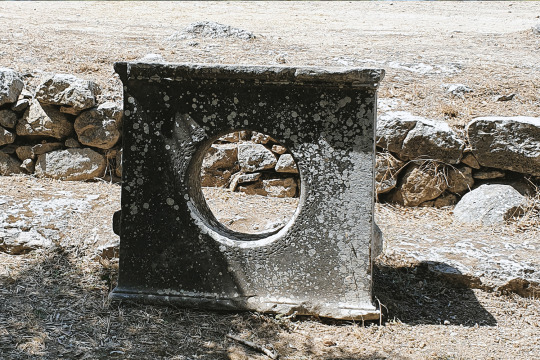
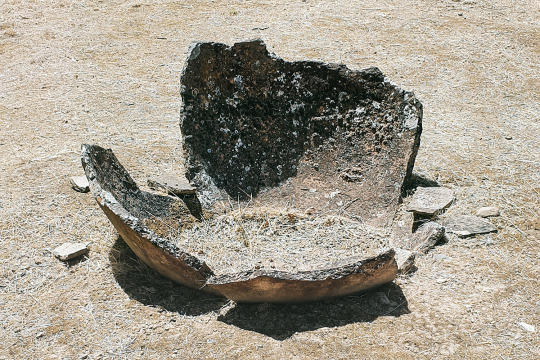
Amphiareion of Oropos (Sanctuary of Amphiaraus), Attica, Greece
#archaeology#ancient greece#amphiareion of oropos#amphiareion#ruins#ancient ruins#history#culture#original photography#travel photography#pottery
245 notes
·
View notes
Photo

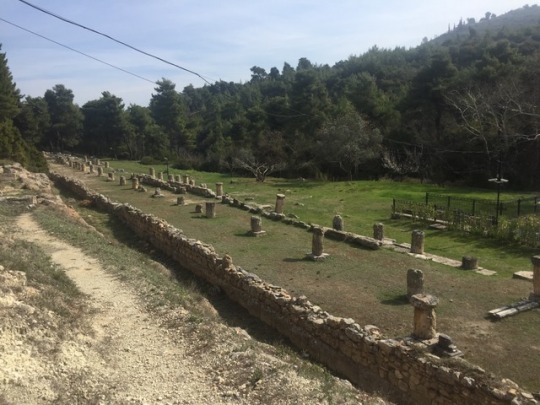
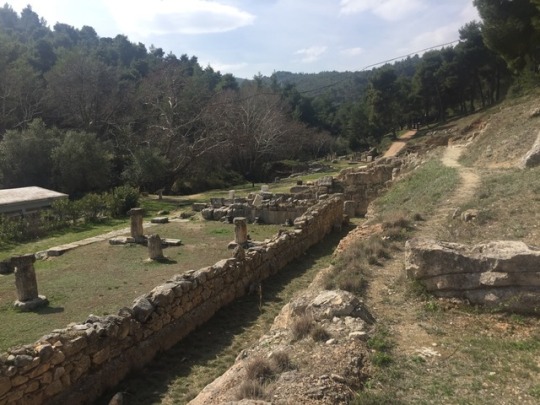
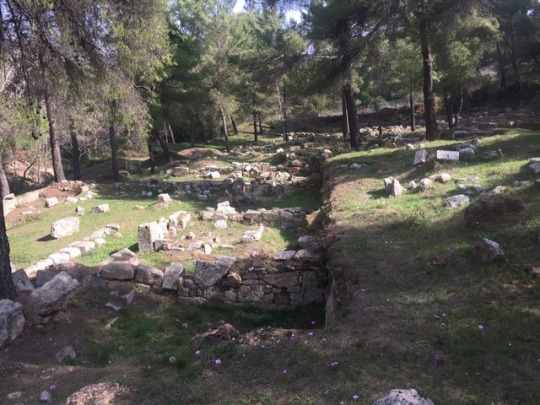
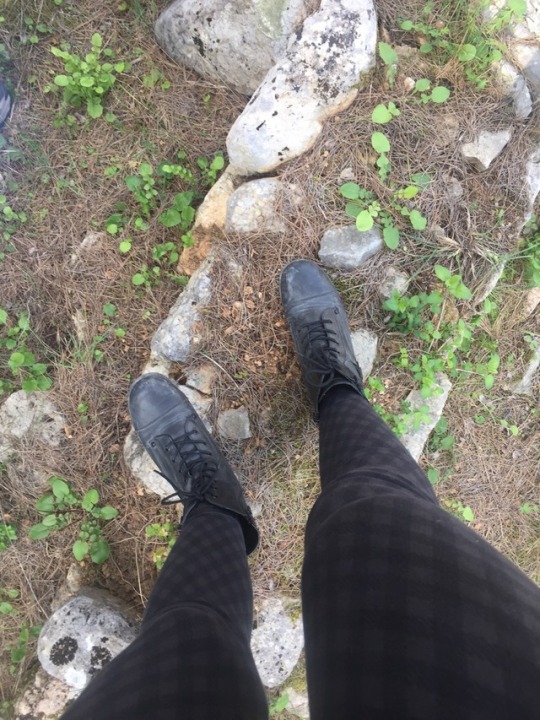
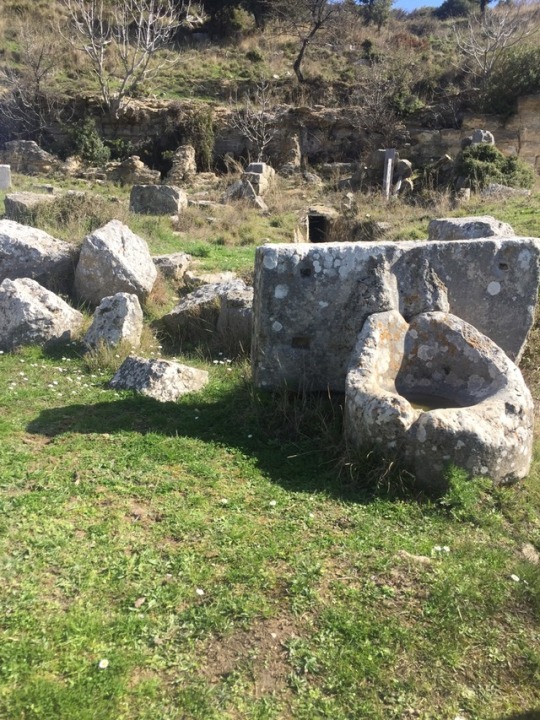
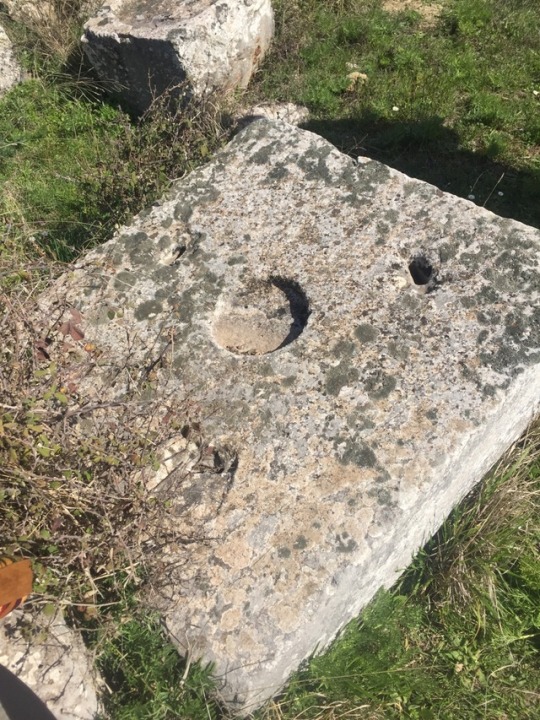
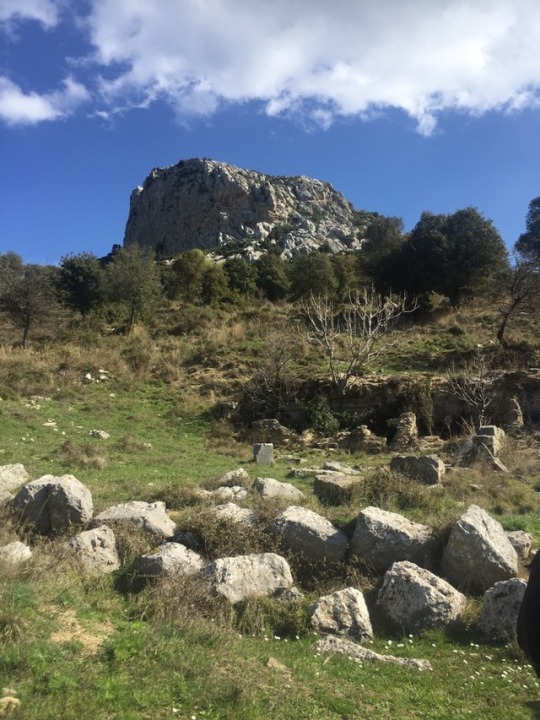
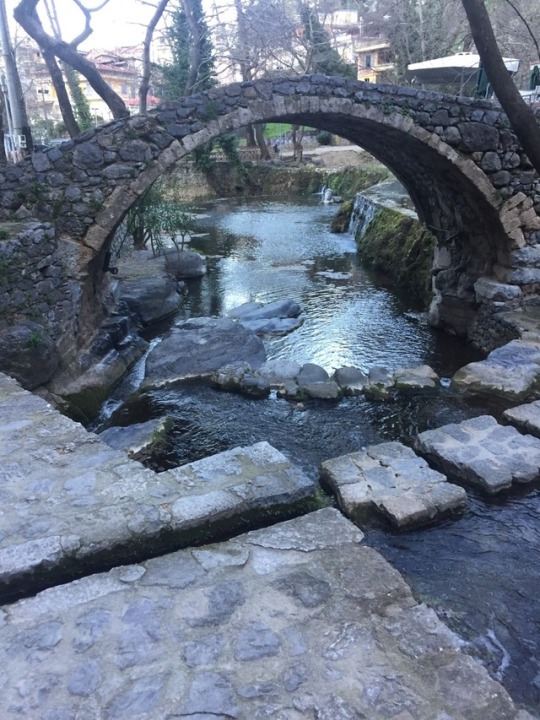
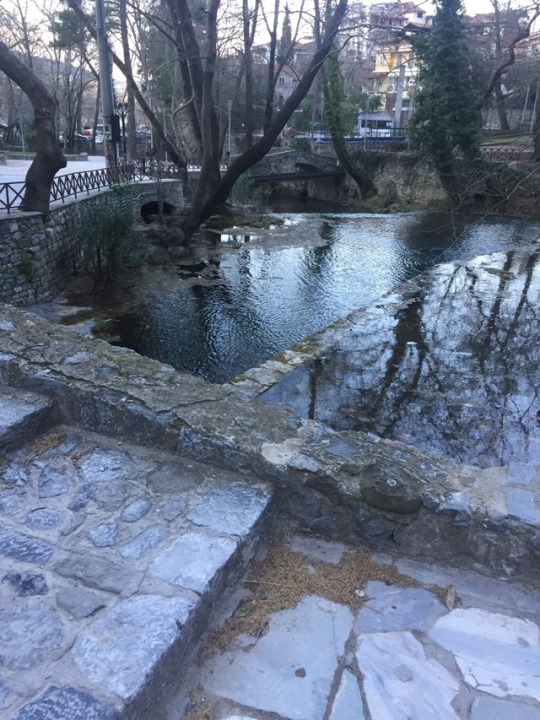
greece day three !!! started the oracle sites today which is the purpose of this trip. did a lot of hiking ??? started outside athens at the sanctuary to amphiaraus where I legitimately climbed 2000+ yr old buildings within the sanctuary. second stop was a sanctuary to apollo ptoios which had an oracle like delphi. last stop ( and where we're staying the night ) is lebadeia which was a healing / oracle center of trophonius ( talked a bit about ancient greek necromancy and hercyna here ) today was honestly chock full of myths and greek countryside :'DD honest to god screeched as we drove past gla ( a mycenaean site in boeotia )
#♆ ╱ ❛ greek shit.#non ca#♆ ╱ ❛ ooc.#im crying tomorrow we reach delphi#i love oracles#i also love myths#and the greek countryside#its so pretty#plus???? seeing gla#i cried#im a bronze age archeologist at heart#the view from apollo ptoios over the copaic basin is amazimh#amazing#moves here
1 note
·
View note
Photo
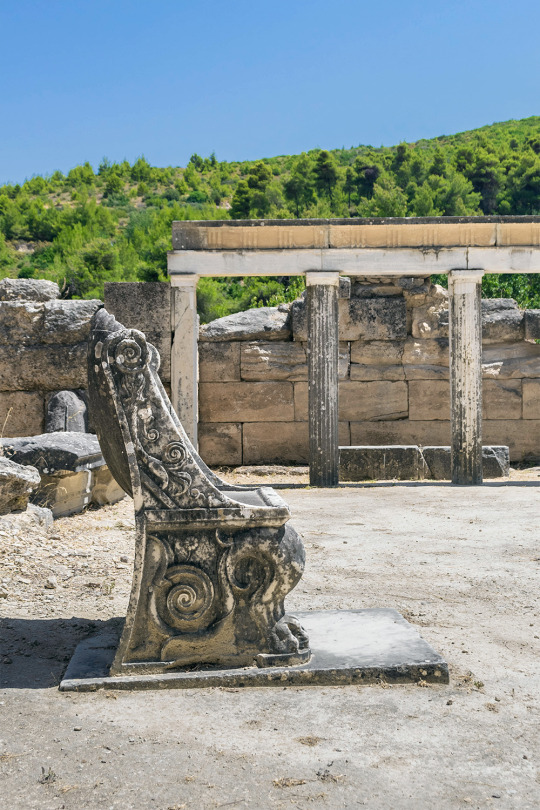
Seat of Honor, Sanctuary of Amphiaraus (Attica, Greece)
#greece#ancient greece#ancient ruins#ruins#sanctuary of amphiaraus#columns#throne#europe#travel#attica#mainland greece#ancient architecture#greek architecture#ancient theater#original photogrpahy#art history
239 notes
·
View notes